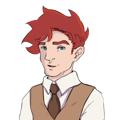Literally Graphic reviewed Peppy in the Wild West by Hergé
Review of 'Peppy in the Wild West' on 'Goodreads'
2 stars
And today we are going to be looking at an extremely politically incorrect work, namely Herge's Peppy in the Wild West.
While this is not a book I had read previously or one that I would necessarily recommend, since I grew up reading Tintin and like to deconstruct books I read before becoming a "totally woke anarchist feminist social justice warrior" this seemed like something I should take a look at. And I'm actually pretty glad I did, if for no other reason then the introduction for this Fantagraphics edition, which while it is incredibly biased in the pro-Herge direction did introduce me to the questions around Herge career during the Nazis occupation and a general timeline of his career beyond Tintin.
Otherwise, this book was an extremely fast supposedly all ages read that probably belongs in a museum but not actually anywhere else. Being all too familiar with the …
And today we are going to be looking at an extremely politically incorrect work, namely Herge's Peppy in the Wild West.
While this is not a book I had read previously or one that I would necessarily recommend, since I grew up reading Tintin and like to deconstruct books I read before becoming a "totally woke anarchist feminist social justice warrior" this seemed like something I should take a look at. And I'm actually pretty glad I did, if for no other reason then the introduction for this Fantagraphics edition, which while it is incredibly biased in the pro-Herge direction did introduce me to the questions around Herge career during the Nazis occupation and a general timeline of his career beyond Tintin.
Otherwise, this book was an extremely fast supposedly all ages read that probably belongs in a museum but not actually anywhere else. Being all too familiar with the "I'm not racist #alllivesmatter I don't see colour" side of things I can see why this book could be found to be a charming all-ages political commentary but it is racist, which does, in fact, trump everything else.
Now having read Peppy in the Wild West, Tintin in America and the oh so incredibly mega racist Tintin in the Congo, it is also kind of interesting (as a person with white privilege) to compare and contrast the different ways in which Herge's racist ideas play out in regards to different groups of people. While I am certainly no expert in anything related to these intersections it does seem obvious that Herge (most likely like many people in his time and place) was profoundly affected by A) romanticized westerns from America B) Belgium's treatment/philosophy/attitude towards their African colony. This is somewhat important to my daily life as well because of an all too common argument against the existence of systematic racism, namely that racism only looks one way and that different people who find themselves outside the social construct umbrella of whiteness cannot be discriminated against in different ways that still boil down to racism.
Both in Peppy in the Wild West and Tintin in America, the indigenous people (misrepresented as a weird mishmash of different tribal customs with a dash of complete fabrication) are much more sympathetic and articulate than the people indigenous to the Congos but no this does not make it less racist.
Even if he is having a bit of fun with them, Herge is still heavily reliant on the racist characters that America produced of its Indigenous peoples, which for someone who supposedly was rather fond of America's indigenous population is only more unacceptable. While I'm sure many of my white peers will have little issue passing this off as a product of its time, the only mitigating factor I currently feel comfortable with is that the original American creators of these stereotypes should be held more responsible for these racist ideas then perhaps the international audience who recycled them. I could also just be subconsciously covering for the fact that I fell in love with Dragonball this past year though, so I will certainly be holding on this idea of responsibility very loosely, especially keeping in mind that many people (apparently particularly in Germany?) still hold similar racist ideas about "revering" the "noble savage" and that many indigenous people across turtle island have gone on the record as finding this rather insulting and racist.
Otherwise, this book was a lot more colorful and simpler then Tintin. I was not aware that Herge had done work that involved anthropomorphized animals, but the influence of Disney on European comics in general and Herge specifically was another interesting part of the introduction.

